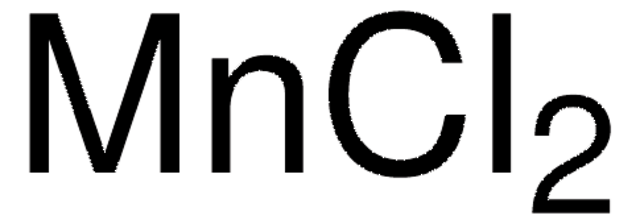M3634
Manganese(II) chloride tetrahydrate
ReagentPlus®, ≥99%
Sign Into View Organizational & Contract Pricing
All Photos(3)
About This Item
Linear Formula:
MnCl2 · 4H2O
CAS Number:
Molecular Weight:
197.91
EC Number:
MDL number:
UNSPSC Code:
12352302
PubChem Substance ID:
NACRES:
NA.21
Assay:
≥99%
form:
powder
Recommended Products
Quality Level
product line
ReagentPlus®
Assay
≥99%
form
powder
pH
3.5-6 (25 °C, 50 g/L)
mp
58 °C (lit.)
SMILES string
Cl[Mn]Cl.[H]O[H].[H]O[H].[H]O[H].[H]O[H]
InChI
1S/2ClH.Mn.4H2O/h2*1H;;4*1H2/q;;+2;;;;/p-2
InChI key
CNFDGXZLMLFIJV-UHFFFAOYSA-L
Looking for similar products? Visit Product Comparison Guide
General description
Manganese(II) chloride tetrahydrate is the tetrahydrate form of manganese(II) chloride. It is used in the preparation of manganese-based hybrid compounds.
Application
Manganese(II) chloride tetrahydrate can be used:
- As a promoter to synthesize dihydropyrimidin-2(1H)-ones by the condensation of aldehyde, β-dicarbonyl compounds, and urea under microwave conditions.
- As a catalyst to synthesize dihydro-2-oxypyrrole derivatives via one-pot four-component domino condensation of dialkyl acetylenedicarboxylate, formaldehyde, and amines.
- To synthesize active manganese oxide with potential application as an oxidant in organic synthesis.
Legal Information
ReagentPlus is a registered trademark of Merck KGaA, Darmstadt, Germany
Signal Word
Danger
Hazard Statements
Precautionary Statements
Hazard Classifications
Acute Tox. 3 Oral - Eye Dam. 1 - STOT RE 2
Target Organs
Brain
Storage Class Code
6.1D - Non-combustible acute toxic Cat.3 / toxic hazardous materials or hazardous materials causing chronic effects
WGK
WGK 2
Flash Point(F)
does not flash
Flash Point(C)
does not flash
Choose from one of the most recent versions:
Already Own This Product?
Find documentation for the products that you have recently purchased in the Document Library.
Customers Also Viewed
Seong-Uk Jin et al.
Magnetic resonance imaging, 31(7), 1143-1149 (2013-05-11)
The cochlear plays a vital role in the sense and sensitivity of hearing; however, there is currently a lack of knowledge regarding the relationships between mechanical transduction of sound at different intensities and frequencies in the cochlear and the neurochemical
Lisha Luo et al.
NMR in biomedicine, 25(12), 1360-1368 (2012-05-11)
The aim of this study was to provide data on the dose dependence of manganese-enhanced MRI (MEMRI) in the visual pathway of experimental rats and to study the toxicity of MnCl₂ to the retina. Sprague-Dawley rats were intravitreally injected with
Anne Bertrand et al.
NeuroImage, 64, 693-702 (2012-09-11)
The impairment of axonal transport by overexpression or hyperphosphorylation of tau is well documented for in vitro conditions; however, only a few studies on this phenomenon have been conducted in vivo, using invasive procedures, and with contradictory results. Here we
Geoffrey J Topping et al.
Medical physics, 40(4), 042502-042502 (2013-04-06)
Manganese(II) is employed as a contrast agent with magnetic resonance imaging (MRI) for study of neuronal activation in rats and mice. However, at the concentrations required for MRI, Mn may induce pharmacological or toxic effects. Positron emission tomography (PET) imaging
A G Kanthasamy et al.
Toxicology letters, 214(3), 288-295 (2012-09-22)
The role of normal cellular prion protein (PrP) remains to be fully elucidated; however, the protein is crucial for the infection and progression of prion diseases. Recent evidence indicates that PrP is a metalloprotein since the octapeptide repeat sequences in
Our team of scientists has experience in all areas of research including Life Science, Material Science, Chemical Synthesis, Chromatography, Analytical and many others.
Contact Technical Service








